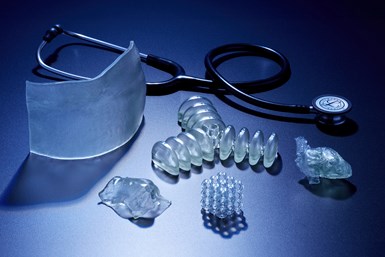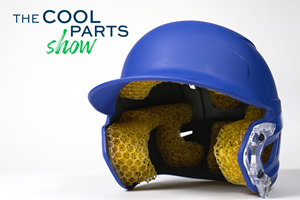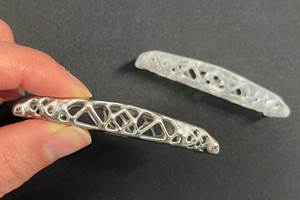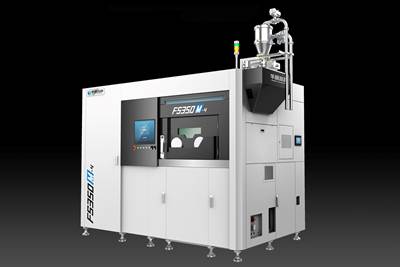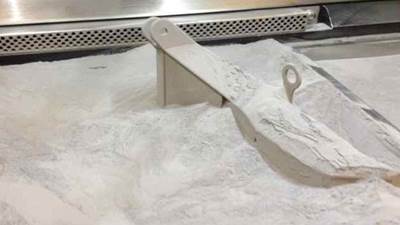Formlabs’ Elastomeric Resins Expand Options for Patient-Specific Care
Formlabs’ first elastomeric BioMed materials — BioMed Elastic 50A Resin, BioMed Flex 80A Resin and IBT Flex Resin — can streamline workflows and reduce labor time for flexible, dental and medical biocompatible parts.
BioMed Elastic 50A Resin is suited for long-term skin contact and short-term mucosal membrane contact for flexible patient-matched medical device components, comfortable medical devices and tissue medical models. Photo Credit: Formlabs
Formlabs has added three health care-focused materials to its library with BioMed Elastic 50A Resin, BioMed Flex 80A Resin and IBT Flex Resin. The two BioMed materials can expand the applications for 3D printing in health care, reducing the time and costs associated with traditional production methods (such as molding) for surgical models, medical devices and more. The IBT Flex Resin is designed with tear-resistant, accurate and transparent properties for dental applications, including 3D printed direct composite restoration guides and indirect bonding trays.
According to Formlabs, since the pandemic 3D printing applications in health care and dental have grown with facilities, health networks and providers turning to 3D printers and medical materials to satisfy demand for patient care to solve supply chain challenges. As providers continue recognizing the benefits of patient-specific care that is possible with 3D printing, Formlabs is supporting the momentum with new materials that will reduce production costs and time, expanding access to patient-specific, directly 3D printed dental guides, surgical models, medical components and medical devices.
“Adoption of 3D printing is accelerating in health care and dentistry, bringing patients the benefit of personalized care that improves comfort and outcomes,” says Guillaume Bailliard, Formlabs president of Health Care. “Formlabs’ materials development team is dedicated to delivering new materials and solutions that will advance 3D printing in health care and dental workflows, and expand the possibilities for patient-specific care. By adding these new flexible and elastomeric materials to our extensive biocompatible and dental materials library, we are ushering in a new wave of personalized health care and digital dentistry that will bring the benefits directly to patients.”
BioMed Elastic 50A Resin and BioMed Flex 80A Resin are biocompatible materials with ISO 10993 and USP Class VI certifications that enable an expanded personalized approach to health care. These materials are suited for long-term skin contact and short-term mucosal membrane contact for flexible patient-matched medical device components, comfortable medical devices and tissue medical models for surgeons to reference in the operating room. Each material delivers varying flexibility to suit different applications.
BioMed Elastic 50A resin is a soft and elastic material for applications requiring comfort, biocompatibility and transparency. The material’s elasticity will suit mass-personalized medical devices requiring long-term skin contact and patient-specific fit, soft-tissue models, gastrointestinal models for fluidics visualization or complex neurovascular models for surgeons to reference in the operating room.
BioMed Flex 80A Resin is a firm, flexible, medical-grade material for applications requiring durability, biocompatibility and transparency. The ability to directly print this medical-grade resin can reduce workflow times by eliminating molding to directly produce flexible, patient-specific medical devices or firm tissue medical models surgeons can reference in the operating room.
IBT Flex Resin is a Class I FDA registered, biocompatible material that delivers consistent, predictable outcomes for printing highly accurate, indirect bonding trays and direct composite restoration guides. With enhanced flexibility, tear resistance and translucency, this material can enable dental labs and clinics to save time and costs while maintaining the accuracy needed for the seamless and precise application of orthodontic brackets and restorative composite materials.
- Learn about Formlabs’ efforts to ease treatment for children with severe burns using face masks produced with 3D printing. Working with Formlabs, the Romans Ferrari Center developed a digital workflow for creating custom compressive masks for treating facial burns using 3D scanning and 3D printing — without having to touch the patient.
- Read about Formlabs’ development of tough elastomer powder for strong, functional, skin-safe parts. The TPU 90A powder is the first elastomer material for its Fuse Series 3D printers and which enables durable, skin-safe parts at a low cost for a variety of industries, including health care, consumer goods, manufacturing and engineering.
- Here are some more additions to Formlabs Material portfolio for dental and medical applications. Formlabs’ Dental LT Comfort Resin is a flexible, durable material for comfortable long-term occlusal splints, nightguards and bleaching trays. BioMed Durable Resin is approved for human contact, and enables durable biocompatible and impact-resistant medical devices and instruments.
Related Content
This Drone Bird with 3D Printed Parts Mimics a Peregrine Falcon: The Cool Parts Show #66
The Drone Bird Company has developed aircraft that mimic birds of prey to scare off problem birds. The drones feature 3D printed fuselages made by Parts on Demand from ALM materials.
Read More3D Printed Spine Implants Made From PEEK Now in Production
Medical device manufacturer Curiteva is producing two families of spinal implants using a proprietary process for 3D printing porous polyether ether ketone (PEEK).
Read More3D Printed Lattices Replace Foam for Customized Helmet Padding: The Cool Parts Show #62
“Digital materials” resulting from engineered flexible polymer structures made through additive manufacturing are tunable to the application and can be tailored to the head of the wearer.
Read MorePossibilities From Electroplating 3D Printed Plastic Parts
Adding layers of nickel or copper to 3D printed polymer can impart desired properties such as electrical conductivity, EMI shielding, abrasion resistance and improved strength — approaching and even exceeding 3D printed metal, according to RePliForm.
Read MoreRead Next
Bike Manufacturer Uses Additive Manufacturing to Create Lighter, More Complex, Customized Parts
Titanium bike frame manufacturer Hanglun Technology mixes precision casting with 3D printing to create bikes that offer increased speed and reduced turbulence during long-distance rides, offering a smoother, faster and more efficient cycling experience.
Read MorePostprocessing Steps and Costs for Metal 3D Printing
When your metal part is done 3D printing, you just pull it out of the machine and start using it, right? Not exactly.
Read MoreAlquist 3D Looks Toward a Carbon-Sequestering Future with 3D Printed Infrastructure
The Colorado startup aims to reduce the carbon footprint of new buildings, homes and city infrastructure with robotic 3D printing and a specialized geopolymer material.
Read More




